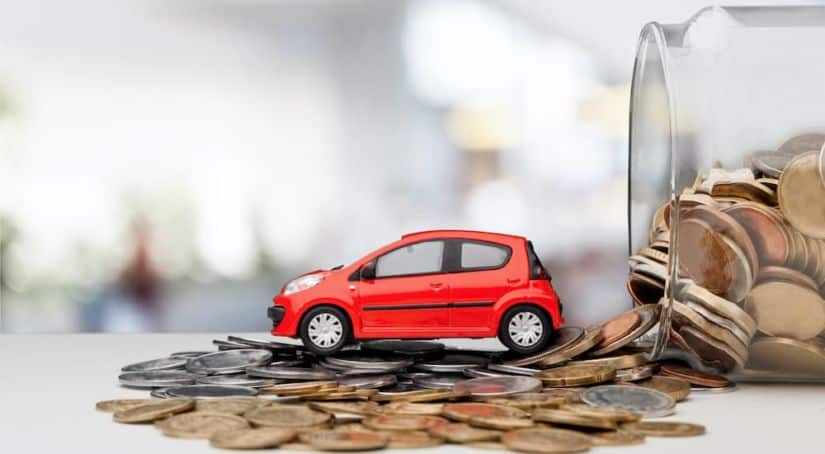Do you need a new car but have a less than stellar credit score? Have you been denied an auto loan from a traditional dealership or lender? Whether you’re trying to establish your credit history or you’re rebuilding your credit, finding an affordable vehicle and financing is possible if you look in the right place. Traditional dealerships work with lenders to offer customers auto loans with competitive interest rates, but there’s another great option known as “buy here, pay here.” Dealerships that offer buy here, pay here terms, and report directly to the credit bureau are an outstanding way to rebuild your credit and find affordable, reliable transportation. Here’s the why and how of it all!
Credit Score: What It Is and Why It Matters
Your credit score is a number between 300 and 850 that reflects your creditworthiness and is used by potential lenders to determine whether or not to give you a loan or line of credit. Your credit score is determined by five factors – types of credit, new credit, duration of credit, payment history, and utilization. For example, a high credit score signifies that you have a strong history of repaying the debt on time, as well as a balance between the types of credit, the usage, and the overall level of debt.
A credit score between 800 to 850 is considered excellent, and anything between 740 to 799 is considered very good. A good score falls between 670 to 739, and a fair score falls between 580 to 669. A poor credit score ranges on the low end from 300 to 579. If your credit score falls below 640, many lenders will charge higher interest rates because you pose a higher risk as a borrower than someone with a higher score. But how exactly is the score determined?
Most financial institutions look at your FICO credit score, which was created by the Fair Isaac Corporation, to determine your creditworthiness. Payment history makes up 35% of your FICO score because it signifies to lenders that you will repay your debt on time and in full. How you utilize your credit makes up 30% of your score and is based on the amount of credit used in relation to your total credit limit. For example, lenders recommend only borrowing 20% or less of your total credit limit.
The remaining 35% of your FICO score is composed of your credit history (15%), new credit (10%), and types of credit (10%). Anytime you apply for a loan, your credit score is checked and, as a result, can negatively impact your score since new credit makes up 10% of your FICO score. Lenders are also looking at the types of credit you have – installment and revolving – as well as the length of your credit history. Because older is better when it comes to financial history, financial experts recommend never closing a credit card.

Buy Here, Pay Here Terms and Your Credit
Whether your low credit score is due to a lack of credit history or the result of financial trouble that led to a string of late payments, dealerships that offer buy here, pay here terms are a great option if you’re looking to buy a car. Many dealerships that offer this type of financing are well aware of the pitfalls of financial struggles and poor credit, which is why they’re committed to helping customers not only find reliable transportation but also rebuild their credit through hassle-free in-house financing. So, how exactly does it work?
Traditional dealerships typically work with a group of lenders that offer automotive loans and competitive interest rates to customers with high or good credit scores. This means that individuals with no credit history or low credit scores are often denied traditional financing and are left to either pay cash for the vehicle, find someone with good credit to cosign on the loan, or find an alternate solution. This is where dealerships with in-house financing make a world of difference.
With in-house financing, the dealership cuts out the middleman and can work directly with you to determine your vehicle budget as well as set monthly payments that are realistic and affordable. This all begins with getting to know you and your needs. From there, you’ll go through the process for credit approval, which is more lenient than traditional dealerships and lenders since the program is designed to help anyone regardless of credit history. Once you’re approved, you’ll work with the finance team to determine an affordable down payment and set the terms of your financing agreement.
After you drive home happy in your “new to you” car, truck, or SUV, it’s up to you to make your monthly payments on time. Why is this important? Many dealerships that offer buy here, pay here financing report to the credit bureau. When you make your payments on time, this goes a long way in rebuilding your credit since payment history makes up 35% of your FICO score. So, not only do you get to drive home in a reliable vehicle, but you also get to rebuild your credit in the process. It’s a win-win!
Car Loans and Credit Rebuilding
There is no quick fix to rebuilding your credit, not even with an auto loan, whether it’s through a traditional lender or with a dealership that offers buy here, pay here terms. In fact, you may see your credit score decrease a few points when your auto loan becomes active, and the debt is added to your credit report. This initial decrease alters your credit history because it’s a new type of credit. However, you’ll notice that the initial decrease will rebound as you continue to make your monthly payments on time and build your payment history. So, building credit this way is not necessarily fast, but it is very effective.

Key Takeaways
Even with the help of dealerships that offer buy here, pay here programs, it’s important to remember that rebuilding your credit takes time and relies on a pattern of responsible borrowing and repayment. Be diligent about making your monthly payments on time, and be mindful of the types of credit you have open. Auto loans, student loans, and mortgages are considered installment credit because they have a fixed price; whereas, credit cards are revolving credit because the amount due each month varies depending on the amount charged. To rebuild your credit, you need a balance of both types of credit.
It’s also important to remember that new credit can negatively impact your score just as much as closing out old credit accounts. For example, if you go to several dealerships and apply for an auto loan at each dealership only to be denied, these credit inquiries can cause your score to decrease. The same is true if you apply for several credit cards within a short period of time since these applications are also considered inquiries. Similarly, closing a line of credit negatively impacts your score because it reduces your credit history, your utilization ratio, and any payment history that can help reestablish yourself as a reputable borrower.
With all this in mind, remember that slow and steady wins the race when it comes to credit. If you’re in the market for a vehicle but find that your credit score is getting in the way of finding reliable transportation, then it’s time to search for a dealership that offers buy here, pay here terms. You’ll find that eliminating the middleman and working directly with the dealer’s in-housing financing can make a world of difference in getting you behind the wheel of a car you can count on and back on the road to rebuilding your credit.



